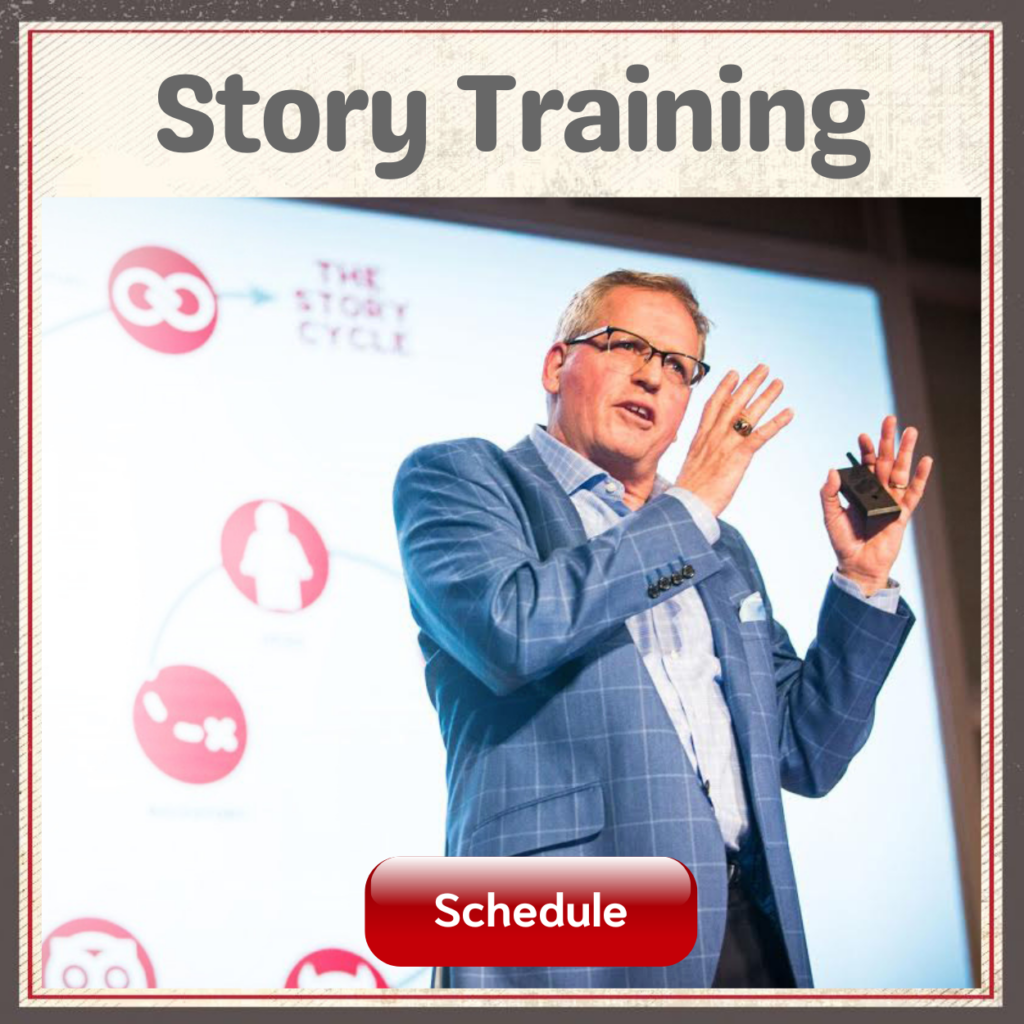
#434: How Stories Drive Learning & Development to Dramatically Upskill Your People
Last spring, I was producing a 90-minute storytelling training for Walmart Canada as part of its Business of Story mastery course.
One of the Walmart associates asked me how many stories I used in my training.
I’d never been asked that before so I wasn’t exactly sure.
At the break, I counted the anecdotes I shared to make the training entertaining and concrete.
To my surprise, in 90 minutes I had used 18 stories to make my storytelling points.
So I counted the stories I use in a typical full-day session and neared 35.
If the following participant testimonial I received from another mastery course I produced at The University of Dayton Center for Leadership is any indication, storytelling in your learning & development works…
“Park Howell is legit! Come and learn to appreciate how your quest for more effective communication can level up. Park steps into Merlin’s role of tutoring with kindness and knowledge.”
I’ve learned that in the realm of education and corporate training, storytelling has emerged as a dynamic and compelling tool to engage, inspire, and educate learners.
(Remember those stare-out-the-window boring lectures in high school?)
But making your training more impactful through storytelling is difficult because you’re not shown how to tell stories using proven narrative frameworks.
Today’s guest explores the importance of modeling all of your training around storytelling.
Charles Good is a distinguished leader in the field of management and leadership. As the President of the Institute for Management Studies, he has transformed the organization into a beacon of excellence in executive education.
With a career spanning over three decades, Charles’s dedication to developing the next generation of leaders is unparalleled. He is a sought-after speaker and thought leader, sharing his insights on effective management strategies at conferences worldwide.
His passion for education and his commitment to fostering innovation in leadership have left an indelible mark on the business world, inspiring countless professionals to reach their full potential.
Why Stories Matter
At the core of the human experience lies the universal love for stories. From ancient legends and myths passed down through generations to contemporary novels and blockbuster films, stories have an enduring appeal. This affinity for storytelling is not a mere coincidence; it’s deeply ingrained in our cognitive and emotional makeup.
When it comes to learning and development, stories provide a compelling way to convey information, making complex concepts relatable and memorable. By framing facts, ideas, and lessons within a narrative structure, trainers can tap into the innate human ability to connect with characters, situations, and emotions.
As a result, learners are more likely to grasp and retain the knowledge presented to them.
Engaging the Learner
One of the key benefits of learning and development storytelling is its ability to captivate and engage the audience. Traditional methods often struggle to maintain learners’ interest, leading to disengagement and diminished retention. Stories, on the other hand, draw people in, making them active participants in the learning process.
Imagine a training session on workplace ethics.
Instead of presenting a list of rules and guidelines, the trainer could share a powerful story about an employee facing an ethical dilemma.
This narrative approach invites learners to empathize with the character, consider different perspectives, and reflect on the consequences of their actions. Such engagement not only ensures a more profound understanding of the subject but also encourages critical thinking and ethical decision-making.
Enhancing Memory Retention
Our brains are wired to remember stories. Research in cognitive psychology has shown that people are more likely to remember information presented in a narrative format compared to dry facts and statistics.
Stories create a mental structure that helps learners organize and recall the content more effectively.
Additionally, the emotional impact of stories plays a significant role in memory retention.
When a story generates an emotional response, whether it’s joy, empathy, or surprise, the brain releases neurotransmitters like dopamine, which enhance memory formation.
As a result, the information embedded within an emotionally resonant story is more likely to be stored in long-term memory.
Fostering Deeper Understanding
Storytelling is not merely a tool for memorization; it also facilitates a deeper understanding of the subject matter.
Stories have the power to simplify complex concepts by presenting them in a relatable context. Learners can see how theories or ideas are applied in real-world scenarios, which clarifies their relevance and practicality.
For example, in a technical training program, explaining the intricacies of a complex system can be challenging. However, by weaving a narrative that follows the journey of a character tasked with operating the system, learners can grasp its functions, potential challenges, and troubleshooting procedures.
The narrative framework helps learners bridge the gap between theory and practice.
Encouraging Application of Knowledge
The true measure of a successful training program is not only what learners know but what they can do with that knowledge. Storytelling excels in this regard by inspiring learners to apply what they’ve learned in their own lives or work situations.
Stories often feature characters who face problems, make decisions and experience consequences. By relating these narratives to real-world scenarios, learners are encouraged to think critically and apply the lessons they’ve learned. This application-oriented approach is especially valuable in corporate training, where the goal is to improve job performance and problem-solving skills.
Storytelling in learning and development training programs is a compelling, multi-faceted tool.
It engages learners on an emotional level, enhances memory retention, fosters deeper understanding, and encourages the practical application of knowledge. By leveraging the power of storytelling, trainers can create immersive learning experiences that result in more effective and impactful learning outcomes. As education and training continue to evolve, the timeless art of storytelling remains a potent force in shaping the minds and abilities of learners.
Discussed in this episode:
- How storytelling engages learners on an emotional level and enhances memory retention.
- Why all expert trainers and coaches should use storytelling to connect with their audiences.
- How Charles used the Story Cycles System™ to reframe the brand story of the Institute of Management Studies.
Links:
Related Episodes You’ll Love:
- #434: How Successful Associations Use Storytelling to Grow Membership with Sean Soth
- #338: How Great Leaders Use Intuition to Tell Their Stories with Dean Newlund
- #373: 5 Agile Conversations That Make Your Business Storytelling More Influential with Douglas Squirrel and Jeffrey Frederick
Your Storytelling Resources:
Connect with me:
- Instagram: https://www.instagram.com/parkhowell/
- Facebook: https://www.facebook.com/groups/BusinessOfStory
- YouTube: https://www.youtube.com/channel/UC0ssjBuBiQjG9PHRgq4Fu6A
- Twitter: https://twitter.com/ParkHowell
- LinkedIn: https://www.linkedin.com/in/parkhowell/
- Website: https://businessofstory.com/abt/
#StoryOn!
 Listen To More Episodes
Listen To More Episodes











